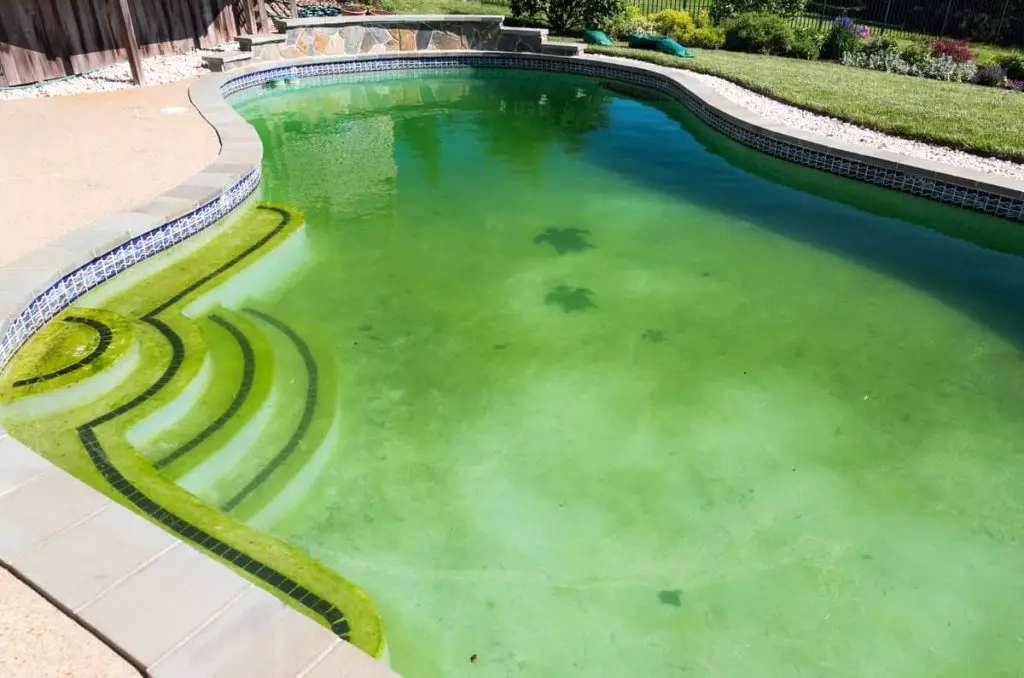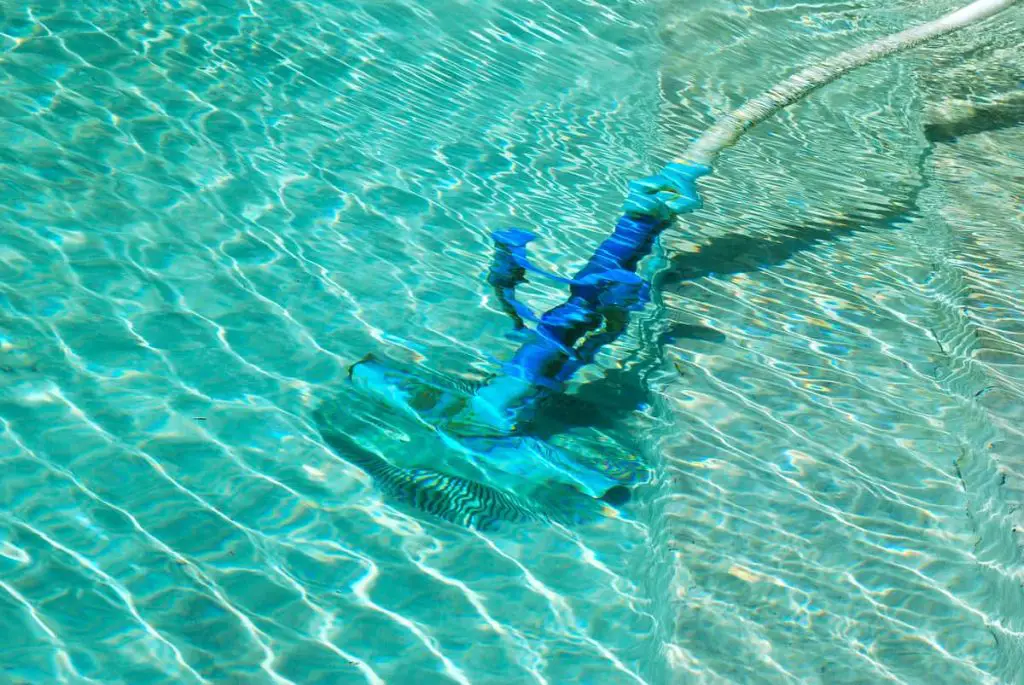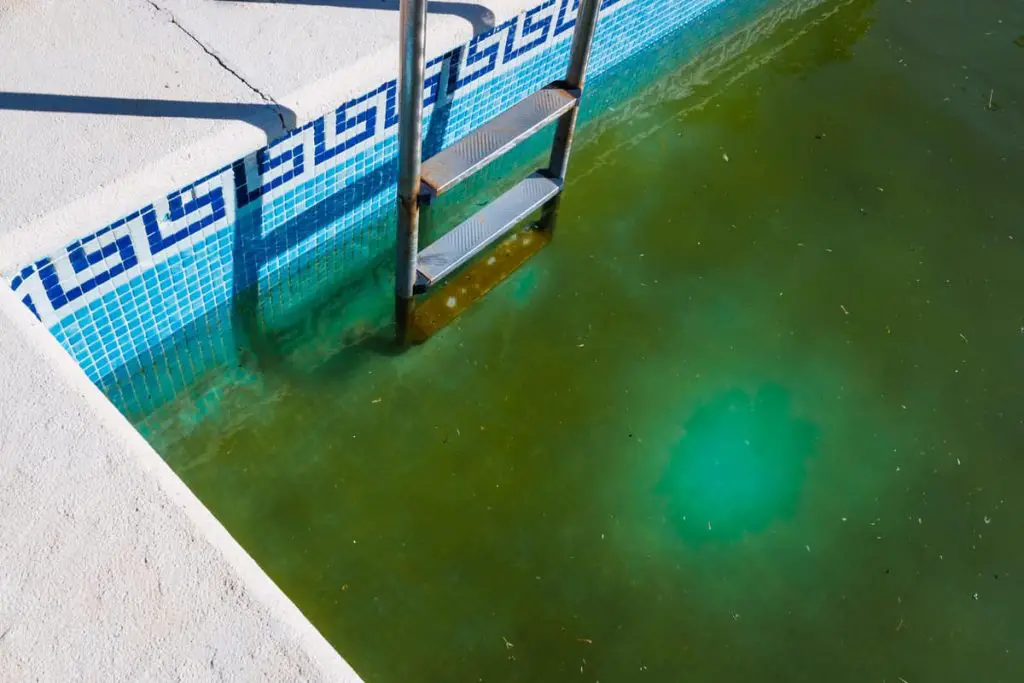Having a pool in your backyard is lovely, especially on those hot summer days! However, like most things worth having, a pool requires maintenance—like ensuring the water is always clean—if you are to reap its benefits.
Over time, pool water will become stagnant if you don’t regularly change it or maintain the proper chemical balance. Stagnant water grows mold and bacteria and attracts parasites, making it unsafe to swim in. Failure to properly maintain or change your pool water is a significant health hazard.
There’s little worse than wanting to go for a swim but finding that the water in your pool has become cloudy with bits of algae and mold floating on the surface. Continue reading to learn why you must maintain your pool and what happens if you don’t change the water.

A Neglected Pool With Stagnant Water Is a Health Hazard
Leaving water in your pool without maintaining it is hazardous. You shouldn’t neglect your pool, leaving it uncovered, unused, and exposed to natural elements like wind and rain.
When neglected and exposed to the elements, the pool water will become stagnant and contaminated. Stagnant water poses a health risk because it likely has bacteria and mold.
You’ll know it’s time to change the water in your pool when you notice the following:
- The water looks gray or cloudy.
- The water turns green from algae.
- There’s mold in the pool.
- The walls of the pool look or feel slimy
- It smells bad.
The pool will look unappealing, and when the water becomes murky from mold, algae, and bacteria, it becomes a health hazard, attracting parasites and mosquitoes. Mosquitoes that breed in dirty water spread diseases like Malaria.
When the water in your pool reaches this stage, you must drain the pool and fill it with fresh, clean water. However, draining your pool at this point comes with risks. Therefore, always take the time to look after your pool, even in winter when you’re not using it.
Avoid Draining Your Pool on Your Own
While it’s sometimes necessary to change the water in your pool, experts advise against doing this yourself. Whether you have a fiberglass, concrete, or vinyl liner pool, there are risks involved in draining it.
The weight of the water maintains the pool’s structure, so emptying the water can cause the walls to crack or collapse or the entire shell of the pool to pop out of the ground. Other risks involved in draining the water from the pool include causing damage to the pool lights, the interior lining, and the in-floor cleaning system.
Apart from risks to the pool, changing the water is a considerable expense and a waste of this precious resource, so it is in your best interests as well as that of the environment to increase the longevity of your pool water.
When you need to change your pool water, always get a professional, reputable pool cleaning service to do the job. A pool cleaning expert will be better equipped to drain the pool without damaging it.
Maintain Your Pool To Avoid Changing the Water So Often
There are ongoing debates around how often one should change pool water.
Some professionals recommend changing pool water every two to three years, while others believe it’s only necessary every five to seven years. Most pool professionals agree that a pool requires regular maintenance to keep it in optimal shape.
The better you maintain your pool, the more time you can wait before changing your pool water.
The following discusses what you should do to maintain your pool:

Clean Your Pool Every Day
You need to clean your pool every day if you want your pool water to remain sparkly blue all the time. Such a routine includes more than just removing leaves and debris from the surface.
If you don’t have the time to do it, you might want to consider hiring a professional to help you. But hiring someone to clean your pool can be costly. That said, try your best to stay on top of the cleaning so that cleaning your pool won’t be overwhelming in the long run.
Check the Pump and Filters
Your pool’s water filter must run at least once a day for all the water to be pumped through it and cleaned. The average time the pump should be on is about eight hours, depending on the size of the pool.
Keep Your Pool’s Chlorine and pH Levels Balanced
Chlorine plays an instrumental role in keeping bacteria out of the pool, and the pH level aids this. If the pH level is very low, the chlorine in the pool is not as effective, but a pH level that is too high can irritate the skin and cause metal parts of the pool to rust. Therefore, it’s essential to regularly check the chlorine and pH levels to make sure they’re balanced.
For more information on pool chlorine and pH levels, check out The Beginner’s Guide to Pool Water Chemistry.
Shock the Pool
Many pool professionals encourage shocking the pool about once a week.
Shocking your pool involves adding chemicals or chlorine to the water to raise the free chlorine level and kill any bacteria or algae that may be developing.

Pay Attention to the TDS levels
TDS (Total Dissolved Solids) levels are the number of minerals or salt in your water.
Hard water contains calcium and magnesium, and when the water evaporates, more of these minerals are left in the pool. These minerals stick to the pool’s walls and floor, and you’ll need to scrub them off. Also, the more minerals in the pool, the more chemicals you’ll need to keep it clean.
If possible, fill your pool with soft water. Soft water only contains sodium, and the water does not need to be changed as often as hard water pools.
Suppose you decide to fill your pool with soft water. You have to regularly test the pH balance because if it’s too soft, it’ll leech the calcium from the pool walls, damaging the pool.
Final Remarks
If you don’t change the water in your pool, it will become stagnant and can eventually grow algae, mold, and bacteria. Your pool will look cloudy and dirty and become a health hazard when this happens.
Regularly cleaning and maintaining your pool will extend the lifespan of your pool water, allowing you to change it less frequently, reducing your water bill and the potential risks involved in draining your pool.
Sources
- Hunker: How Often Do You Need to Change Pool Water?
- R&R Pools: What Happens When You Don’t Maintain Your Pool
- Distallata: How Often Should Pool Water Be Changed
- The Pool Butler: When to Drain a Swimming Pool
- STOP Restoration: 5 Signs that Tell You to Change Your Pool Water
- Deep Blue: How Often Should I Replace the Pool Water
- Pool Water Recycling: The Dangers of Draining a Swimming Pool
- Alpha and Omega Pool Services: Why it’s Important to Keep Swimming Pool PH levels Balanced
- Centers for Disease Control and Prevention: Frequently Asked Questions (FAQs)

